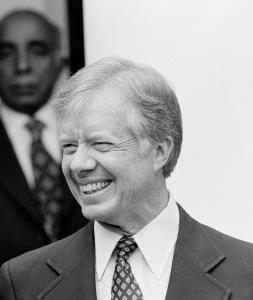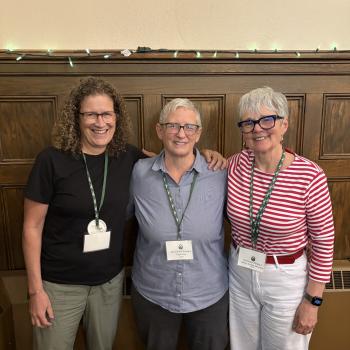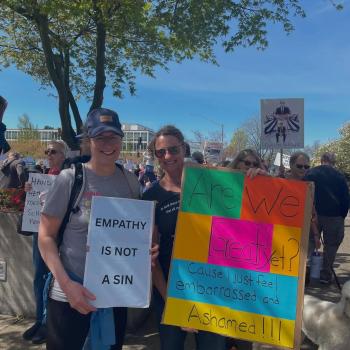In my first election, I chose Jimmy Carter.
I was in seventh grade, so my vote didn’t count. But at Hillsboro Middle School in Kansas, a friend and I were vocal supporters of Carter, fighting against the many Mennonite Brethren in our classes who campaigned for Ronald Reagan in our school-wide mock election. We were Mennonites too—seemed like almost everyone in Hillsboro was—but of a different type, and because our parents were Democrats, we vehemently advocated for the Democratic ticket, whatever that meant.
In 1980, that meant choosing Carter. I doubt I knew much of what Carter stood for, beyond the kinds of values my parents held, alongside the other adults at First Mennonite who taught us social justice, if only by osmosis. At the time when Carter was campaigning, I had no sense of the economic hardships others in America were facing; and only the vaguest idea that a hostage crisis was unfolding in Iran, because my parents listened to NPR, which extensively covered the year-long event.

Of course, Carter lost in a landslide, not only in the United States, but at Hillsboro Middle School, too. I can still recall the sting of disappointment, the gloating of my peers in locker-lined hallways, my disbelief, even, that Reagan would be chosen over a good man like Carter. No doubt, I heard dismay from my parents, too, that so many Mennonites in Hillsboro would elect Reagan. Being confounded about many Mennonites’ choice for president became part of my mindset, long before I fully understood that being Mennonite—and Christian—was not a monolith, nor comprehended why Christians might choose Reagan over a godly man like Carter.
Still, Carter’s post-presidency—considered by some the most successful of anyone who has held office—has only intensified this dismay: that some Christians would question Carter’s faith. That they would see other politicians, far more craven and power-hungry, as “more Christian” than Carter. That they would even doubt whether Carter would see Jesus in the afterlife, a claim I saw on Threads this weekend. (Similarly, the Christian nationalist William Wolfe opined on X that Carter had “left the faith long ago” and that he “was not a Bible-believing Christian by any stretch.”)
Of course, an overwhelming number of people on social media and in real life saw Carter for the deeply faithful man he was. His work with Habitat for Humanity has been featured widely in his obituaries, reflective of his commitment to make affordable housing a human right. He was so beloved and wise as a Sunday school teacher at Maranatha Baptist Church that people would line up the night before he taught, just to get a spot for his lessons. His 77-year marriage reflected his fidelity to Rosalyn, but also to the sanctity of marriage, an institution he hoped would be afforded to LGBTQ folks who, he affirmed in 2015, deserved a similar kind of love.
Mostly, Carter modeled a kind of faith that went so far beyond the rigid black and white thinking that now animates much of current-day evangelicalism (and which has given us a president-elect unlike Carter in almost every way). Carter recognized that following the principles of Jesus into politics was not easy. As Jon Ward reported yesterday, Carter knew that faith in the town square and on the national stage involved “compromise and moral complexity,” character virtues that few politicians now are willing to acknowledge as necessary in leading pluralistic societies.
As 2024 comes to a close, my social media feeds are full of suggestions for how my life might be made better in the upcoming year, with diets and workout goals and organization planners and a million other ways for a new year and a new me.
But reading obituaries about Carter and the profound work he did in the name of Christ challenges me to a different kind of resolution. Carter lived out his faith on the national and international stage, for sure. But more powerfully, Carter lived out his faith in the local town square, serving Jesus for much of his life in a humble house located in Plains, Georgia. So much of his love for Jesus and for others radiated from that place.
May 2025 be the year we all make similar efforts to follow his model of living out faith in our local communities, or where ever we are planted.













